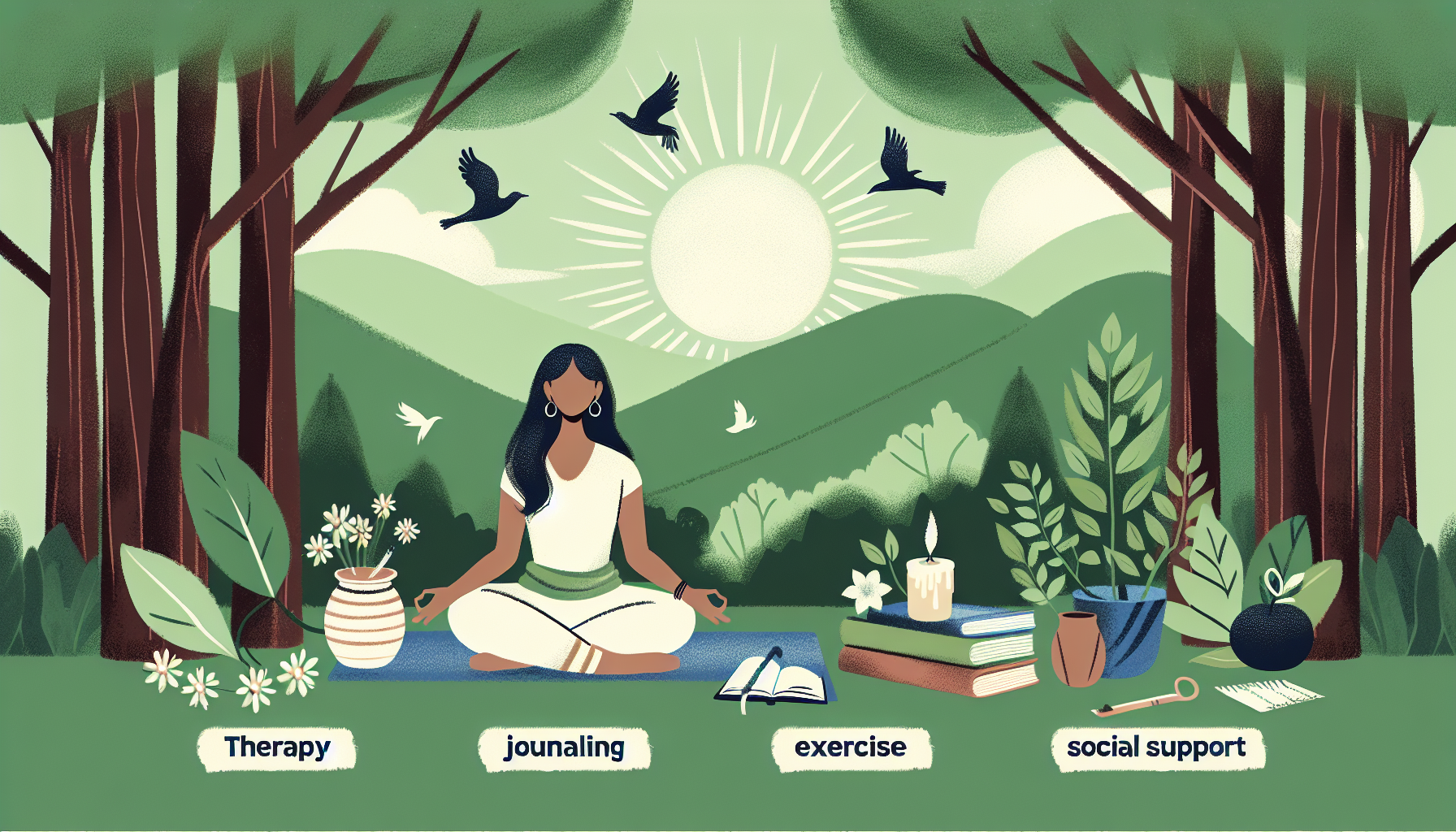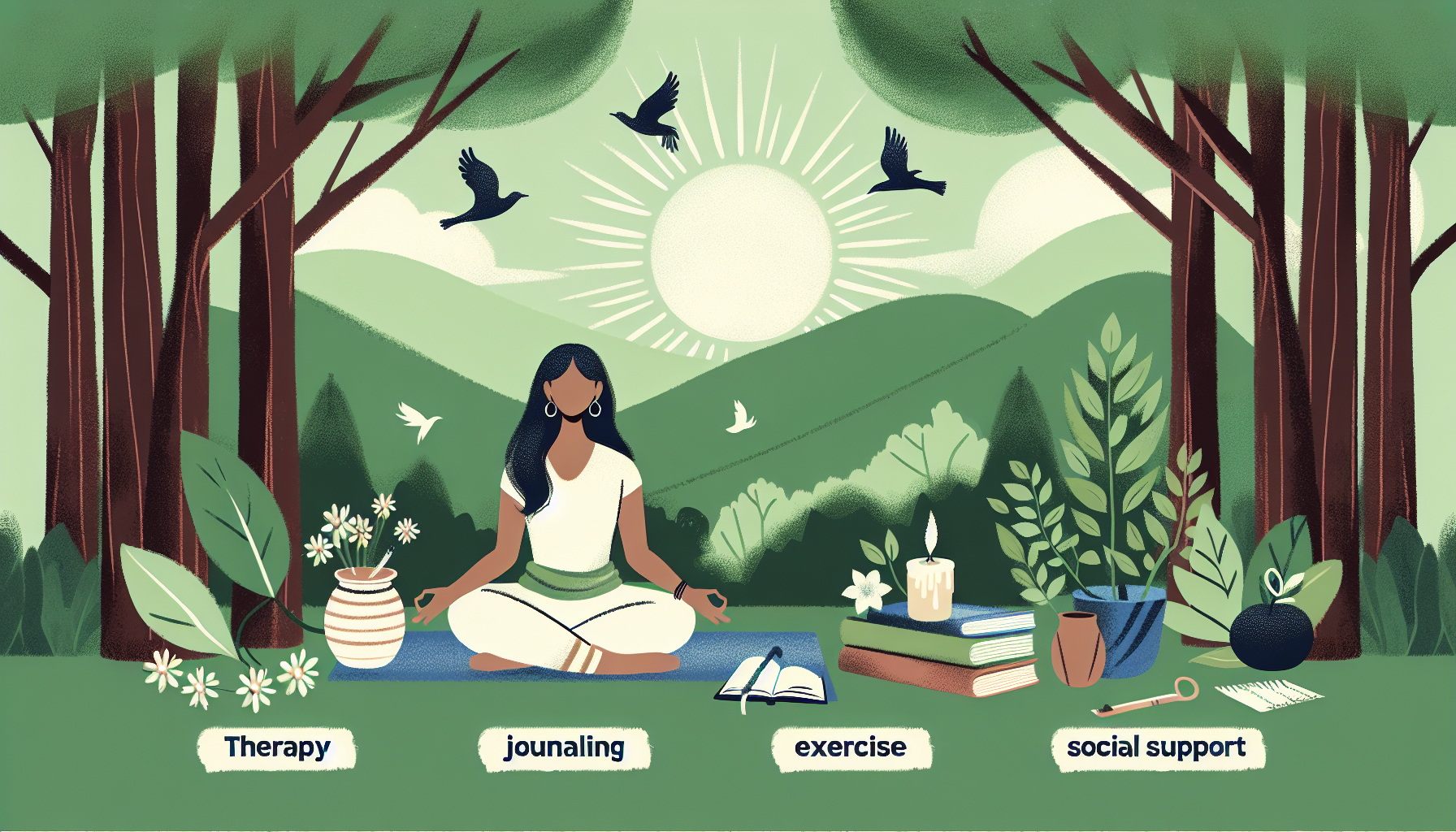In the aftermath of a disaster, it is essential to address not only the physical damage but also the emotional toll it takes on individuals. Whether it is a natural calamity or a man-made catastrophe, the emotional impact can be overwhelming. This article highlights some of the top ways to cope with the emotional aftermath of a disaster, offering practical tips and advice to help you navigate the difficult journey towards healing and rebuilding. From self-care techniques to seeking support from loved ones, these coping strategies are designed to provide comfort and solace during challenging times.
Recognize and Validate Your Feelings
Acknowledge your emotions
One of the first steps in coping with the emotional impact of a disaster is to recognize and acknowledge your feelings. It is completely normal to experience a wide range of emotions such as fear, sadness, anger, and frustration during difficult times. By acknowledging and accepting these emotions, you are giving yourself permission to feel and allowing yourself to process what you are going through.
Allow yourself to grieve
Grief is a natural response to loss and can be experienced after a disaster. It is important to allow yourself to grieve for what has been lost – whether it be personal belongings, a sense of safety, or even the loss of a loved one. Give yourself permission to express your grief in a way that feels right for you. This may include crying, writing in a journal, or talking to a trusted friend or family member.
Seek support from others
During challenging times, it is crucial to reach out for support from the people around you. Talk to family members, friends, or neighbors about what you are experiencing. Sharing your feelings with others who have gone through similar situations can be incredibly comforting and reassuring. Additionally, consider seeking professional support from a therapist or counselor who can provide guidance and help you navigate through your emotions.
Practice Self-Care
Take care of your physical health
Taking care of your physical well-being is essential for managing your emotional health after a disaster. Make sure to prioritize activities such as getting enough sleep, eating nutritious meals, and engaging in regular exercise. Physical activity, even if it’s a short walk or stretching routine, can help reduce stress and improve your overall mood.
Engage in relaxation techniques
Incorporating relaxation techniques into your daily routine can help calm your mind and alleviate stress. Deep breathing exercises, meditation, and progressive muscle relaxation are all effective methods to relax your body and mind. Take a few minutes each day to practice these techniques and give yourself the opportunity to unwind and recharge.
Maintain a routine
Establishing a sense of routine and structure can provide a sense of stability and normalcy during times of uncertainty. Create a daily schedule that includes activities you enjoy and tasks that need to be done. This can help anchor you and give you a sense of control over your day, even when other aspects of your life may feel chaotic.

Limit Exposure to News and Social Media
Set boundaries for yourself
While it’s necessary to stay informed about what is happening around you, being constantly bombarded with distressing news can take a toll on your emotional well-being. Set boundaries for yourself when it comes to news consumption. Consider designating specific times during the day to catch up on updates and avoid excessive exposure throughout the rest of the day.
Choose reliable sources for information
In order to avoid misinformation or unnecessary anxiety, make sure to rely on trustworthy sources for your news and updates. Seek out information from reputable organizations and government agencies that provide accurate and up-to-date information. This can help you stay informed without falling prey to sensationalized or false reports.
Take breaks from news consumption
Taking breaks from news consumption can be incredibly beneficial for your mental health. Instead of constantly checking for updates, allocate some time each day for activities that bring you joy and help you detach from the overwhelming coverage. Engage in hobbies, spend time with loved ones, or immerse yourself in a good book to give your mind the opportunity to rest and recharge.
Surround Yourself with a Supportive Network
Lean on family and friends
When facing the emotional impact of a disaster, it is important to lean on your support system. Reach out to family and friends who can provide comfort, understanding, and a listening ear. Share your experiences, thoughts, and feelings with them, and allow their presence to provide you with a sense of security and solidarity.
Participate in support groups or counseling
Support groups and counseling services can offer a safe and supportive environment for individuals to share their experiences, connect with others, and gain valuable coping strategies. Look for local organizations or online communities that offer support groups specifically catered to those affected by a disaster. If needed, seek professional counseling to work through any trauma or complex emotions that may arise.
Connect with others who have experienced similar situations
Finding solace in the stories and experiences of others who have gone through similar situations can be incredibly validating. Reach out to community organizations or online forums where you can connect with individuals who have experienced the emotional impact of a disaster. Sharing your journey with others who understand firsthand can foster a sense of empathy, belonging, and hope.

Express Your Emotions
Keep a journal
Writing can serve as a powerful outlet for your emotions, allowing you to express yourself freely and without judgment. Consider keeping a journal where you can document your thoughts, feelings, and experiences. This can serve as both a cathartic release and a way to track your progress as you navigate through the emotional impact of the disaster.
Talk to loved ones about your feelings
Open and honest communication with loved ones is crucial when it comes to processing and coping with your emotions. Share your thoughts and feelings with those you trust, allowing them to offer support, guidance, and a listening ear. Verbalizing your emotions can provide relief and allow you to gain perspective and insights from those close to you.
Engage in creative outlets
Engaging in creative outlets such as art, music, or dance can be therapeutic and help you express your emotions in a non-verbal way. Find a creative activity that resonates with you and devote time to it regularly. Whether it’s painting, playing an instrument, or writing poetry, these creative outlets can provide an outlet for strong emotions and serve as a form of self-expression.
Practice Mindfulness and Meditation
Focus on the present moment
Practicing mindfulness involves redirecting your attention to the present moment, allowing you to cultivate a sense of calm and awareness. This can be particularly helpful when dealing with the emotional impact of a disaster. Take a few moments each day to focus on your breath, notice your surroundings, and ground yourself in the present. This can help alleviate anxiety and promote emotional stability.
Use deep breathing exercises
Deep breathing exercises are a simple yet effective technique to reduce stress and promote relaxation. Practice taking slow, deep breaths, inhaling through your nose and exhaling through your mouth. Deep breathing can activate your body’s natural relaxation response, calming your mind and decreasing feelings of tension or distress.
Try guided meditation apps
Guided meditation apps can be a valuable resource in helping you cultivate mindfulness and find inner peace during challenging times. These apps offer a variety of guided meditation practices designed to reduce stress, promote well-being, and enhance self-awareness. Explore different apps to find the ones that resonate with you and incorporate them into your daily routine.
Seek Professional Help
Consult with a mental health professional
If you find it challenging to cope with the emotional impact of a disaster on your own, consider consulting with a mental health professional. They are trained to provide guidance, support, and evidence-based techniques to help you navigate through difficult emotions. Don’t hesitate to reach out for professional help if you feel overwhelmed or if your emotional well-being is significantly affected.
Consider therapy or counseling
Therapy or counseling can provide a safe and confidential space for you to process your emotions, work through trauma, and develop effective coping strategies. A therapist can assist you in developing resilience and provide valuable insights into your emotions and behaviors. Consider seeking therapy or counseling as a proactive step towards managing the emotional impact of a disaster.
Explore treatment options such as medication
In some cases, medication may be necessary to alleviate severe symptoms of anxiety, depression, or post-traumatic stress disorder (PTSD) that may arise following a disaster. Consult with a mental health professional who can assess your needs and provide appropriate treatment options. Medication, when used in combination with therapy or counseling, can help restore emotional balance and provide relief from distressing symptoms.
Engage in Healthy Coping Mechanisms
Exercise regularly
Engaging in regular physical exercise is not only beneficial for your physical health but also for your emotional well-being. Exercise releases endorphins, which are natural mood enhancers, and can reduce symptoms of anxiety and depression. Choose activities that you enjoy, such as going for a walk, practicing yoga, or participating in a team sport, and aim to incorporate exercise into your routine.
Maintain a balanced diet
Proper nutrition plays a vital role in maintaining overall well-being. Eat a balanced diet that includes fruits, vegetables, whole grains, lean proteins, and healthy fats. Avoid excessive consumption of sugary or processed foods, as they can contribute to mood swings and energy crashes. Fueling your body with nutritious foods can contribute to increased energy levels and a stable mood.
Avoid excessive alcohol or substance use
During times of emotional distress, it’s important to be mindful of your alcohol or substance use. While it may temporarily numb or mask your emotions, excessive consumption can worsen feelings of anxiety or depression, and even lead to dependency. Instead, seek healthy coping mechanisms such as talking to someone, engaging in hobbies, or practicing relaxation techniques.
Maintain a Sense of Normalcy
Resume daily activities
As much as possible, try to resume your regular daily activities in the aftermath of a disaster. This can help restore a sense of normalcy and routine in your life, providing stability and a distraction from distressing emotions. Whether it’s going to work, taking care of household chores, or engaging in hobbies, maintaining your routine can give you a sense of control and purpose.
Set achievable goals
Setting small, achievable goals can play a significant role in your emotional recovery. Focus on realistic goals that you can accomplish one step at a time. Whether it’s completing a household task, participating in a new activity, or volunteering in the community, achieving these goals can boost your self-esteem and help you regain a sense of accomplishment.
Create a structured routine
Creating a structured routine can provide a solid foundation during times of uncertainty. Plan out your days by allocating time for work, self-care, leisure, and socializing. A structured routine can help you feel more organized, reduce feelings of chaos or overwhelm, and provide a sense of stability in an otherwise unpredictable situation.
Practice Gratitude and Positive Thinking
Focus on the good in your life
During challenging times, it can be easy to get caught up in negativity and focus solely on the negative aspects of your situation. However, actively shifting your focus to the positive aspects of your life can have a profound impact on your emotional well-being. Make it a habit to identify and appreciate the things you are grateful for each day, no matter how small. This shift in perspective can bring about feelings of joy, hope, and resilience.
Count your blessings
Take time each day to reflect on the blessings in your life. This can be as simple as appreciating the support of your loved ones, the roof over your head, or the beauty of nature. By acknowledging the positive aspects of your life, you can cultivate a sense of gratitude and foster a more positive outlook.
Challenge negative thoughts
Negative thoughts and self-criticism can be detrimental to your emotional well-being. Instead of accepting these negative thoughts as absolute truths, challenge them and replace them with more positive and realistic beliefs. Practice self-compassion and remind yourself that it’s normal to experience a range of emotions during difficult times. Reframe negative thoughts into more empowering and optimistic ones, and gradually cultivate a positive mindset.
In conclusion, coping with the emotional impact of a disaster takes time, effort, and support. By recognizing and validating your feelings, practicing self-care, limiting exposure to news and social media, surrounding yourself with a supportive network, expressing your emotions, practicing mindfulness and meditation, seeking professional help when needed, engaging in healthy coping mechanisms, maintaining a sense of normalcy, and practicing gratitude and positive thinking, you can begin to navigate through the challenges and find emotional stability and resilience. Remember, it is important to be patient with yourself and allow yourself the space to heal and recover. You are not alone, and with the right strategies and support, you can overcome the emotional impact of a disaster and emerge stronger.
